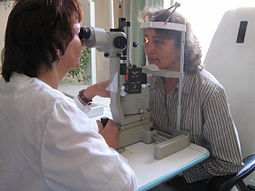Ophthamology

Eye examination with aid of a slit lamp.
|
|
| System | Eye |
|---|---|
| Significant diseases | Blindness, cataracts, macular degeneration, glaucoma |
| Significant tests | Visual field test, ophthalmoscopy |
| Specialist | Ophthalmologist |
Ophthalmology (/ˌɒfθɑːlˈmɑːlədʒi/ or /ˌɒpθɑːlˈmɒlədʒi/) is the branch of medicine that deals with the anatomy, physiology and diseases of the eyeball. An ophthalmologist is a specialist in medical and surgical eye problems. Since ophthalmologists perform operations on eyes, they are both surgical and medical specialists. A multitude of diseases and conditions can be diagnosed from the eye.
The Greek roots of the word ophthalmology are ὀφθαλμό (ophthalmos, "eye") and -λoγία (-logia, "study, discourse"), i.e., "the study of eyes". The discipline applies to all animal eyes, whether human or not, since the practice and procedures are quite similar with respect to disease processes, while differences in anatomy or disease prevalence, whether subtle or substantial, may differentiate the two.
The Indian surgeon Sushruta wrote Sushruta Samhita in Sanskrit in about 800 BC which describes 76 ocular diseases (of these 51 surgical) as well as several ophthalmological surgical instruments and techniques. His description of cataract surgery was more akin to extracapsular lens extraction than to couching. He has been described as the first cataract surgeon.
...
Wikipedia
